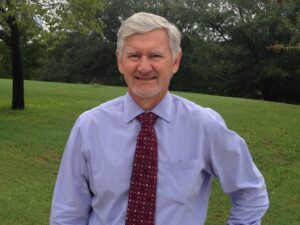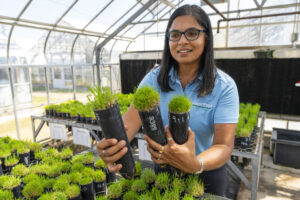Texas A&M AgriLife Research names new directorship of center at Dallas
New leadership remains steadfast in commitment to promoting urban agriculture, healthy living
Daniel Leskovar, Ph.D., and Ambika Chandra, Ph.D., assumed the roles of director and assistant director at the Texas A&M AgriLife Research and Extension Center at Dallas on Jan. 1.

Leskovar, professor in the Texas A&M College of Agriculture and Life Sciences Department of Horticultural Sciences and director of the Texas A&M AgriLife Research and Extension Center at Uvalde, has been serving as interim director of the Texas A&M AgriLife center at Dallas since March 2020.
Chandra, a Texas A&M AgriLife Research turfgrass breeder and professor in the Department of Soil and Crop Sciences, has led the turfgrass breeding program in Dallas since 2007. She will continue managing that program as the center’s assistant director.
“We are very pleased to welcome Dr. Leskovar and Dr. Chandra to these leadership roles in Dallas,” said G. Cliff Lamb, director of AgriLife Research. “Their directorship represents a significant step forward in nourishing health, strengthening communities, protecting natural resources and supporting economies in North Texas.”
The Texas A&M AgriLife center at Dallas is one of the 13 centers across Texas working to advance research, public outreach and educational programs throughout the state. Each center tailors its mission to meet the needs of the region.
In their new leadership roles in Dallas, Leskovar and Chandra will oversee the center’s mission to promote urban horticulture and forestry, the effective use of water and land resources, urban landscapes and healthy living for all Texans.
Daniel Leskovar
Leskovar began serving as an AgriLife Research vegetable physiologist in 1991 in Uvalde. With a background in horticultural sciences, he is an expert in plant physiology, soil science, irrigation, hydroponics and integrated crop management.
In Uvalde, Leskovar oversaw research projects in vegetable physiology, aiming to uncover the mechanisms plants use to adapt to environmental stresses. He also guided the center’s collaboration on multistate and international research projects.
Throughout his career, Leskovar has significantly contributed to new knowledge in plant responses to abiotic stresses and crop management systems. He has served as associate director for the Texas A&M Vegetable and Fruit Improvement Center, and his leadership helped the unit broaden engagement with regional vegetable industries and stakeholders and expand collaboration among researchers and graduate students.
Leskovar earned a bachelor’s degree in horticulture from the National University of Comahue in Neuquén, Argentina; a master’s degree in vegetable crops from the University of California, Davis; and a doctoral degree in vegetable crops from the University of Florida, Gainesville. He was vice-chair and chair of the Division of Vegetables, Roots and Tubers at the International Society for Horticultural Science for 12 years and is the current president elect of the American Society of Horticultural Sciences.
Leskovar said. “This center houses an incredible group of research and extension specialists. I look forward to growing with them and embracing the task of shaping a more sustainable and prosperous world.”
Ambika Chandra
As assistant director, Chandra will work alongside Leskovar to meet the needs of Dallas area residents, the industry and beyond.

Chandra earned a bachelor’s degree in agriculture and a master’s in plant breeding and genetics from Punjab Agricultural University in Ludhiana, Punjab, India. She also holds a doctoral degree in agronomy from Pennsylvania State University. She became a Texas A&M professor in 2007.
As a researcher, Chandra has focused primarily on breeding turfgrass cultivars, which requires an interdisciplinary approach involving high-throughput phenotyping, genomics, physiology, agronomy, soil sciences and more.
Her program has developed stress-tolerant and climate-resilient turfgrass cultivars produced worldwide. Chandra’s contributions have included great strides in sustainable urban living through the reduced use of water and pesticides in urban communities as well as through new opportunities for academic collaboration with public and private sectors, both nationally and internationally.
“I’ve been at the center in Dallas for years now, and one thing I love about it is the unique challenges of a deeply urban region,” Chandra said. “It offers a lot of exciting ways to view agriculture. Developing cultivars of turfgrass, which are used for golf courses and athletic fields, is one of them. It might not come to mind when people think of agriculture, but it’s vital for the functionality and environmental sustainability of urban communities.
“We collaborate with public and private sectors on turfgrass research and development, and it’s just one way that we’re advancing science to promote sustainable urban living,” she said. “As the new assistant director, I am excited to work with research and extension faculty at the center to help address more of these priorities across a diverse range of scientific disciplines for industry professionals and communities.”


